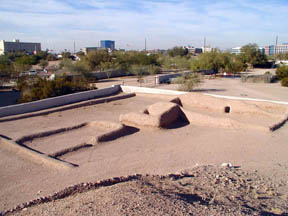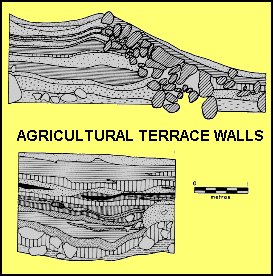Our research is global in scope, with active faculty research on every continent. We span the range of prehistoric societies from the earliest hominids to prehistoric cities. ASU has particular geographic strengths in the American Southwest and Midwest, Mesoamerica, and the Mediterranean, with major research focusing on the origins of modern humans, the origins and spread of agriculture, the dynamics of societal growth and collapse, biocultural processes, and the development of urbanism.
Our 21 permanent faculty are theoretically diverse, yet share an overall scientific approach to the past. We offer a diversity of methodological training, from traditional artifact analysis to cutting-edge computer modeling. While we seek to understand the human past, we also endeavor to apply this understanding to important issues faced today, including the interaction of humans and the environment, and causes and consequences of urbanization. Please see our list of research themes for more information. Prospective students should also consult our detailed list of current research projects by SHESC archaeologists. This document shows the breadth and strengh of current archaeological research at ASU.
Archaeology is part of the larger Anthropology program at ASU, situated in the dynamic and interdisciplinary setting of the School of Human Evolution and Social Change. Within the school, archaeology students can gain experience in early hominid paleoanthropology, urban anthropology, and complex systems modeling to enrich their archaeological training. Many students also work with faculty and programs beyond SHESC in fields like materials science, Quaternary geosciences, social dynamics, urban ecology, and global sustainability.
Here are some reasons that the best applicants consider graduate study in archaeology at ASU:
• With 21 full-time faculty in archaeology, we have one of the largest programs in the U.S.
• Our faculty stand out internationally for the quantity and quality of publications and external grants, most of include the participation ograduate students.
• The quality of our students is very high because the program is highly selective.
• ASU grad students publish in the top journals and have good records for grants and professional employment.
Download a 2-page brochure on the archaeology program.
Archaeology students are admitted to the Ph.D. program in anthropology. To obtain a PhD in Anthropology with a concentration in archaeology, those without an M.A. are required to acquire MA-level training. The master’s program is designed to develop professional competence in field, laboratory, and library research, with a strong foundation in theoretical concepts and methods of archaeological analysis. Students are trained to make significant research contributions through the application of archaeological method and theory to specific bodies of archaeological information.
The archaeology graduate program at ASU endeavors to provide students with 1) a breadth of background in archaeological and anthropological knowledge in order that as professionals they can converse with and appreciate the approaches and contributions of a diversity of colleagues, and 2) a depth of background in the region and topics in which the student plans to develop advanced competence. The breadth is provided largely through the curriculum outlined below, although field work in diverse regions of the world is also encouraged. Depth is provided principally through preparation for the doctoral exams, the dissertation proposal, dissertation research, and the writing of the dissertation. Our graduate program in archaeology in particular stresses comparative social analysis and expertise in quantitative methods.
Students generally work closely with faculty and are encouraged to take advantage of opportunities for archaeological research offered through faculty research programs, field schools, the Archaeological Research Institute, the Center for Bioarchaeological Research, and the Institute of Human Origins. Supporting these activities are ceramic, pollen, faunal, and general purpose laboratories, computer equipment, and computerized databases and extensive archaeological collections.
ASU has an active and interactive cohort of archaeology graduate students. During their graduate studies, these students have been extremely successful in publishing peer-reviewed articles, obtaining external funding from sources including the National Science Foundation and the Wenner-Gren Foundation for Anthropological Research, and developing strong teaching records.
Curricular Track for Graduate Study in Archaeology at ASU
The curricular track in archaeology is comprised of SHESC required courses, archaeology courses, and suggested courses in archaeology and related fields.
SHESC Required Courses:
All students should have a broad training in archaeology. To accomplish this aim, students should take:
In consultation with her or his committee, the student selects additional courses that best fit the student’s needs.
In preparing their programs of study archaeology students are strongly recommended to take courses in the following areas:
Students are also strongly advised to gain in-depth field work experience.
Complex Societies courses
Theoretical Topics Courses

For More Information:
![]()
© 2007, School of Human Evolution and Social Change (modified 9/10/2007)